Hello, my friends. My name is Bohdan. We discuss the goal of SEO.
In lesson number five, we’ve shed some light on the method of a SEO where it’s been called an experiment of running polls.

So, by this we say that SEO is truly a scientific activity. Only something that’s been acquired as a result of experiment, something that has been substantiated with proofs, fixed and repetitive can be called a knowledge. And this is what we can take for knowledge.
The goal of SEO. What is it about?
In the light of what we’ve known so far: What is the goal of SEO? What all the SEO activities are geared towards?
So we know that under the idea of this long data acquisition funnel, which combines both technical and user-related data, we may say that in SEO they have some ready made requirements from search engines that just can be taken and implemented. But this is a minority of cases.
In the majority of cases, the requirements for optimization are unknown or not announced. And in order to suggest improvements the SEOs come with hypotheses in the first place. So to come up with hypotheses, SEOs work as data analysts.
We start with data and try to combine:
- technical data: what bots “think”,
- user related data: what users think,
- financial and strategic data: what the company management think,
knit it all together and produce a hypothesis, a far-stretching or simple (however we can), and this hypothesis needs to be communicated as a function of its viability.
So we obviously must communicate the viable hypothesis. So it’s something that’s attainable within the scope of a SEO. Something belonging to us, not to Product or Finance, and something that’s worth spending time and resources.
1. Formulate a hypothesis and prove a viability of testing it
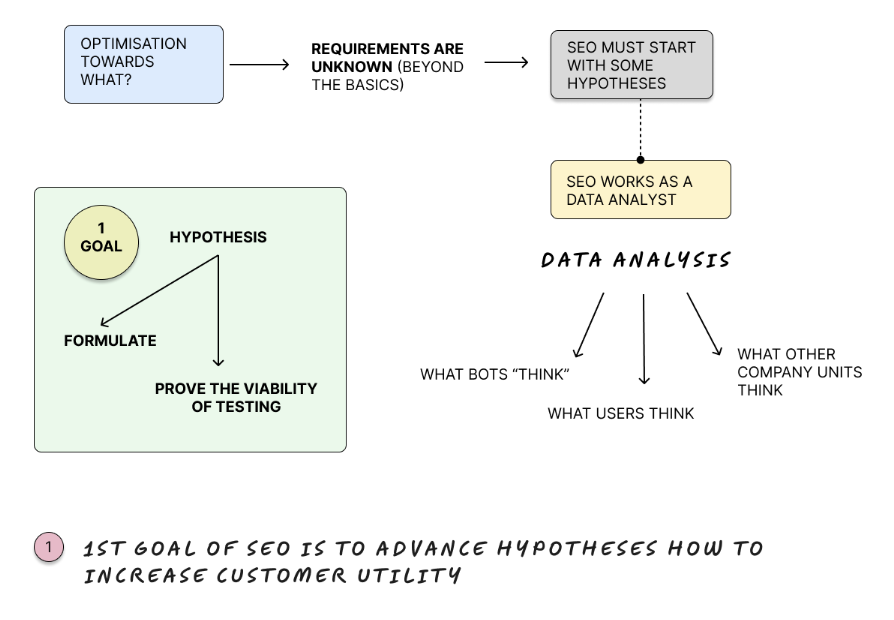
So the first goal of SEO is to arrive at a hypothesis and then communicate the viability of doing this experiment. We don’t pause here.
2. Frame the experiment that leads to testing of hypothesis
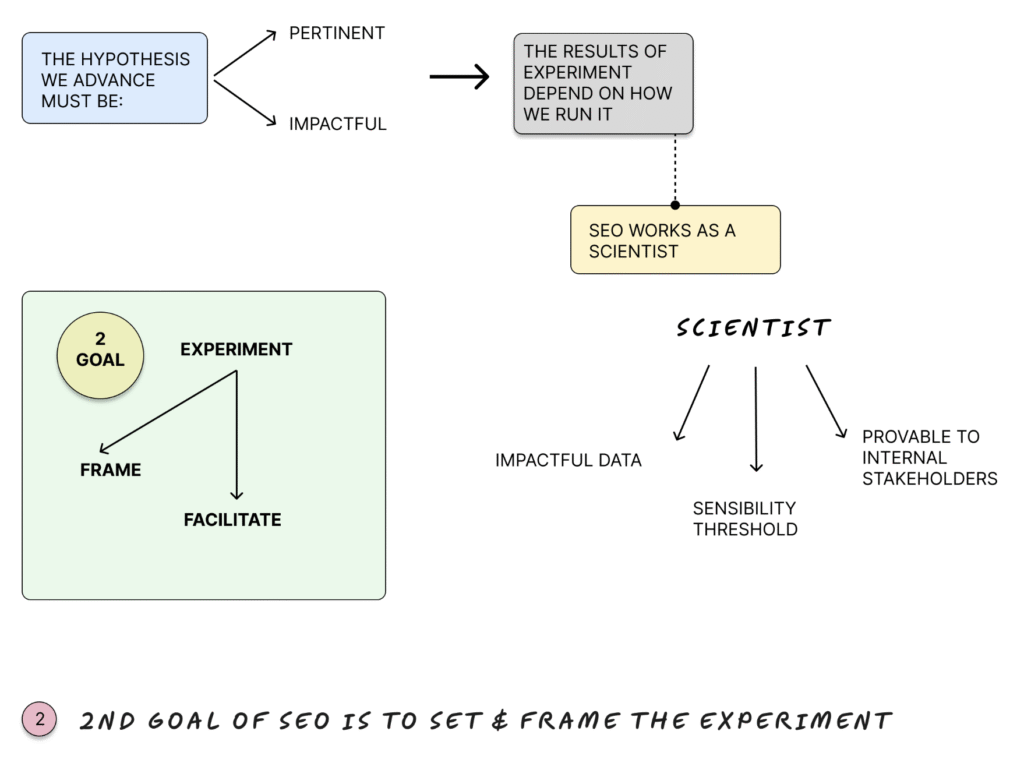
The second idea or the second goal of SEO is to facilitate the very experiment in order for it to get impactful or reassuring results. So, the experiment needs to be done properly. The results must be:
- pertinent,
- Impactful or strong,
- reassuring.
It means that lots of things depend on how you run this experiment.
So, a SEO, as a person who has recourse to this data, who understands the limitation of the reasoning coming from this data, must settle or devise the experiment in such a way something that comes from it will be provable to the array of stake stakeholders.
The framing of the experiment is something that also belongs with SEO. And this is a goal of SEO to not only arrive and communicate the viability of the experiment, but also to facilitate how we stage it, to facilitate its work.
3. Disseminate the knowledge acquired
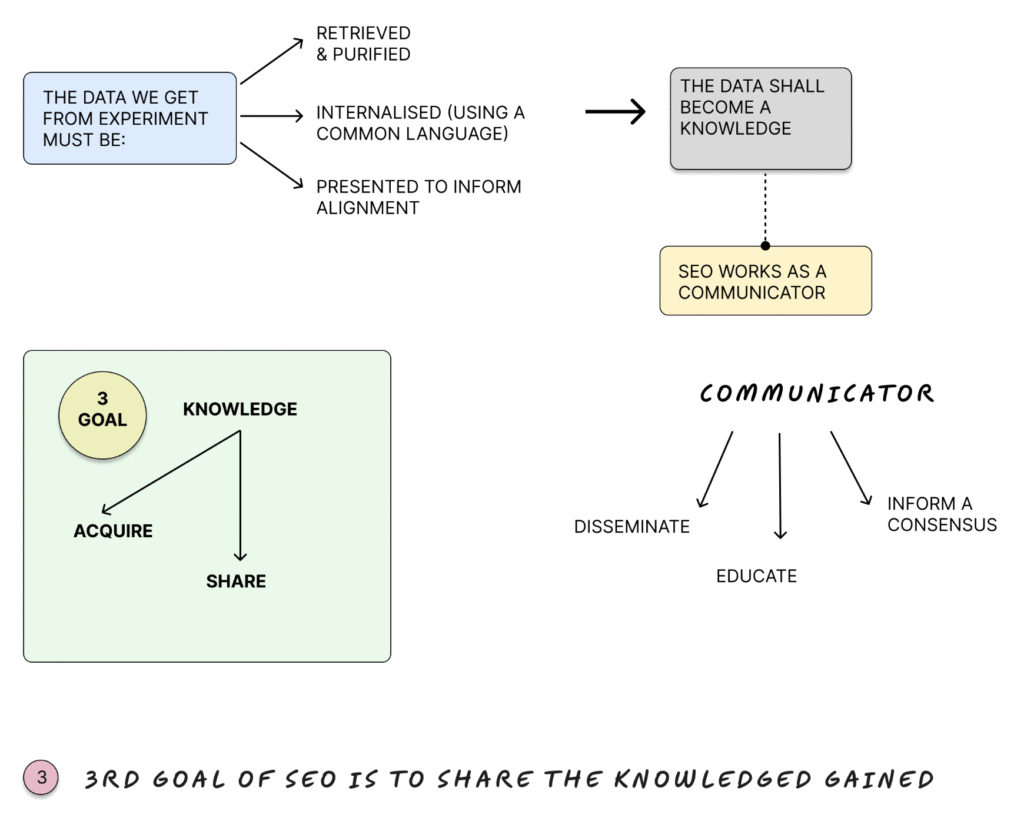
Later on as we acquire the results of the experiment, the goal of SEO is to disseminate the knowledge acquired from it to a wider group of company stakeholders.
So it means that knowledge has to be:
- retreated from the experiment itself,
- digested using some kind of terms or language understandable to the wider group of stakeholders and then
- presented in such a way as to hopefully inform some kind of alignment or concerted activity.
So disseminating the knowledge and informing a consensus around something is this very important part of SEO, not purely technical, though.
4. Help to ensure the results are reproducible
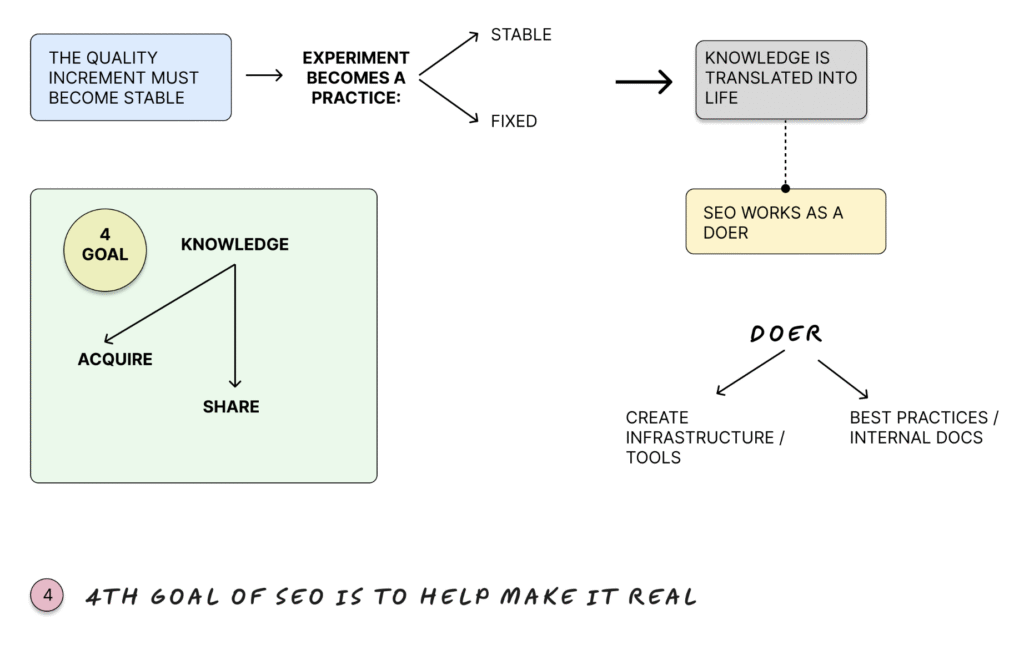
Finally, ensuring that the production of stable or repetitive results is institutionalized in the company.
So results get reproducible. They’re not occurring only once. They’re not just outlays of experiments. They are stable and fixed. So this is what is required for incremental returns.
Institutionalizing the results or returns in SEO requires a lot of internal policy making, internal power, but without this the results won’t be reproducible, won’t be stable. So we cannot go to the poll number two as we discussed in the previous lesson and say:
“Hey, Google, we produce more customer utility as per, say, a spot number three versus the competitor. So,it belongs to us, a spot number three – against this group of search queries shall be ours – probably even spot number two”.
We are giving away the stable return for this spot. And this, the term “stable” is instrumental and important to describe the fourth goal of ensuring the repeatability and predictability of these results.
So, the main terms here:
- a communication or translation into the common language,
- the viability of the experiment,
- the facilitation of the experiment, how it occurs, how it takes place,
- dissemination of the knowledge acquired in simple native language of the company, and
- ensuring the way we get the structure to reproduce once again the results of this experiments
is something that is descriptive of the SEO and something that makes the goal of SEO.
Experiment is in the spotlight
So let’s go a little deeper in this idea of experiment. For sure we will continue doing so in the next lesson, but for the sake of this discussion, let’s just say the experiment has three stages, which can and give us more information about micro goals of SEO.
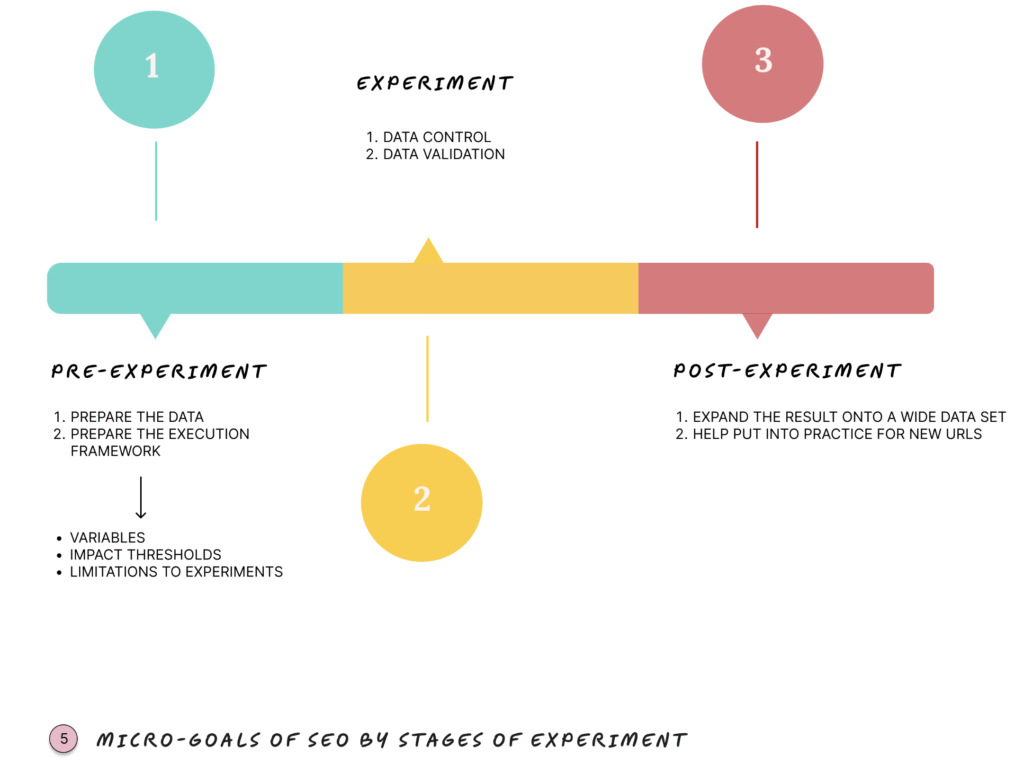
In the pre-experiment stage the goal of SEO is to prepare the data & execution framework
So in the first stage, a pre-experiment setting, the goal of SEO is to research the viability of probing, i.e. whether or not we go there, so to say, a “go or not go” decision. To do so, the first micro goal is to prepare the data. More to say, to find the data patterns that point in the direction of some kind of oddity. This data may support, help us find hypotheses and support it.
Secondly, the micro goal of SEO is the preparation of an execution framework as we’ve:
- have spotted some odd data
- have got some doubts or ideas, and, therefore,
- are willing to prepare the framework for execution of the experiment.
This is how we are ready to come up with a hypothesis and we try to define what kind of arguments are needed to support or refute this hypothesis.
Apart from the hypothesis and arguments, the experiment execution framework includes:
- defining variables to be tested, what we want to know, what we want to test, and
- discussing the strengths of impact: what will be enough the prove the existence of whatever connection, function, and finally
- setting the limitation of experiments: understand where lies the limit, what could go wrong, what we test vs not.
During the experiment stage the goal of SEO is to control and validate its execution
Then, during the experiments, the micro goals of SEO are:
- data controls and
- data validation.
So we must validate that the experiment has even started, all the stages of the experiment goes through validation and we control what data we take versus not, whether or not it’s confirmed to the requirements of the experiment or not.
After the experiment the goal of SEO is to facilitate the results are reproducible
Finally, in the post experiment setting, the micro goal is to facilitate the enablement of repetitive results or facilitate the institutionalisation of results.
These are micro goals on the level of experiment that’s in the spotlight.
Let’s have some doubt in the goal of SEO as we put it
Finally, let’s have some doubt in this formulation of goal. So as we said, the goals hinge somewhere around the notion of experiment that uses the language of facilitation, of information organization, and setting hypotheses and trying to prove them. But it’s very abstract.
Why don’t we even say that the goal of SEO is to increase traffic or the website using organic search, using search engines, which is native to this very formulation of the term “search engine optimisation”. Why don’t we go that way? To this effect I have two large arguments.
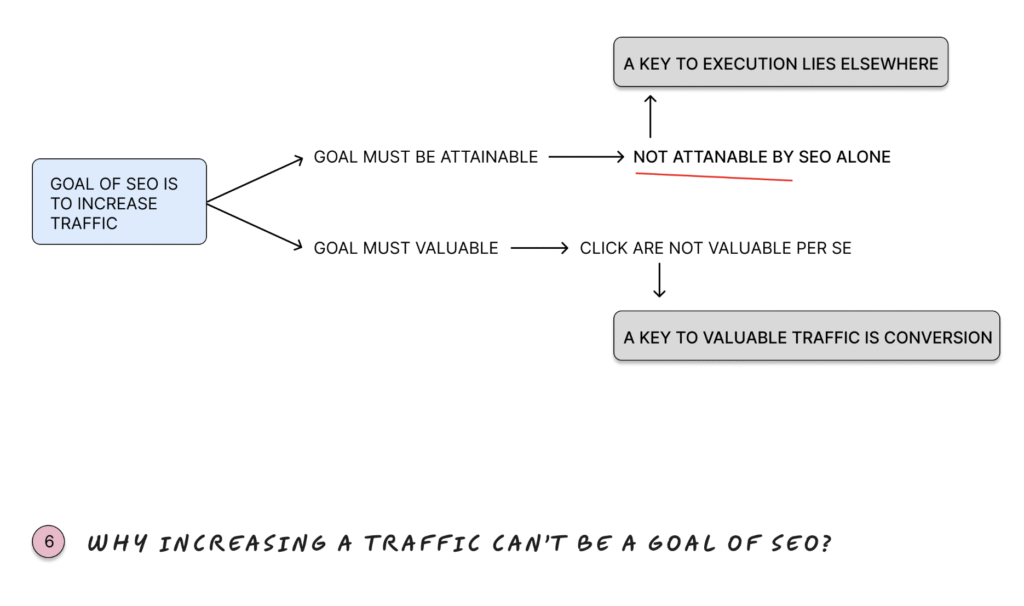
First, for something to serve as a goal, it must be principally attainable. So this must be attainable in principle or at all. Let’s think if the goal of increasing traffic from search engines is even attainable to SEO (or lies within the limits of SEO or can be attained by means of SEO)?
No matter how far stretching the SEO efforts are, SEO alone cannot function as the entire organization. So, the goal of SEO is more or less strategizing or trying to direct other units through information analysis and setting hypotheses. The actual job to be released on different units like engineers or content and so forth.
So, from this standpoint, the goal of increasing the traffic is not attainable by SEO. It may happen such that the experiment or the job of SEO has been done properly, but the experiment has not even started because the key to execution lies elsewhere. SEO cannot have control of it. This is how I want to say that SEO cannot actually increase traffic because, at most, it might be guiding other units over something that will hopefully bring more traffic, more clicks, considering many limitations and things that may go wrong within the company.
To put frankly, SEO cannot bring or increase traffic alone, and it cannot serve as a goal of SEO or a metric to judge whether or not it’s successful.
And finally if you think about a goal as such doesn’t it have to unite. Or doesn’t it have to be something that aligns or drives together the company activity? So that if increasing the traffic is a goal, will it align the company activity? Will it guide it into a single direction?
Obviously, no. Because traffic, as such, is nothing. It doesn’t mean much to finance, to sales. If, for example, we put another metric, i.e. traffic with a certain level of conversion, or, say, traffic equates leads (conversion equates translation of leads into paid customers), then it makes certain sense for other units of the company.
Then, this is to say the goal of SEO is to acquire traffic that converts at a certain rate to customers, which have customer value like this and so forth, then it acquires some sense. But then again, someone from another department would say, okay, it’s not about traffic, it’s about conversion.
Let’s increase conversion, but not the traffic, and we’ve got a conflict. We’ve got many points of conflict here to say that increase in the traffic as such, even in the most traffic sensitive industry, can be a guiding principle of the organization because it’s not universal. It’s hardly translatable into the language of OKRs and other activities.
Because the company doesn’t understand, doesn’t even need traffic, the company needs what’s needed, i.e. financial performance and customer-related metrics and so forth.
Therefore, if we try to doubt this and try to say that the goal of SEO is elsewhere, for example, the goal is to acquire traffic or to drive more traffic, then possibly it’s wrong, because we cannot substantiate it, we cannot answer these simple questions as I just posed.
Summary
Let’s make a small summary of the things we’ve discussed so far. So we’ve discussed that the goal of SEO is hard to formulate because customers do not generally announce their requirements, so the requirements must be taken from somewhere (else).
This is why the experiment – as a way to acquire customer requirements – is essential to SEO. Here we put it in the spotlight. And from here come four of his goals. First is to try to formulate a hypothesis on the basis of data, then try to prove the viability of this hypothesis in order to test it.
Then goes the second goal of SEO to frame how experiment must go and how it must lead to testing of this hypothesis. Thirdly, the goal of SEO is to disseminate their acquired knowledge in order to increase the information share, and increase the number of interactions around something. And finally, the fourth goal is to ensure results are stable, they get in the form of institutional process and are available to reproduce themself.
Postback from Lesson 20
The goal of SEO activity is:
- analyze the value stream and the supporting data to identify the waste by each step of the flow,
- eliminate the waste, because improvement means cutting the waste,
- share the better ways to do things across the organization and
- commit to redesigning of the underlying processes because good processes bring good results.

Leave a Reply